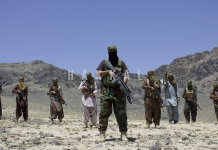New Delhi (NVI): The Central government has constituted six Inter-Ministerial Central Teams for West Bengal, Maharashtra, Madhya Pradesh and Rajasthan to take stock of complaints regarding the implementation of lockdown, supply of essential commodities, social distancing and preparedness of health infrastructure to deal with the spread of COVID-19.
These ICMTs will make an on-spot assessment of the situation and issue necessary directions to State Authorities for its redressal and submit their report to Central Government in larger interest of general public, the Ministry of Home Affairs said in a statement released today.
Two teams have been constituted each for West Bengal and Maharashtra and 1 each for Madhya Pradesh and Rajasthan.
“Situation is specially serious in Indore (MP), Mumbai and Pune (Maharashtra), Jaipur (Rajasthan) and Kolkata, Howrah, Medinipur East, 24 Parganas North, Darjeeling, Kalimpong and Jalpaiguri in West Bengal,” the statement read.
The ICMT’s will also focus on safety of health professionals and conditions of the relief camps for labour and poor people in these areas.
“It may be mentioned that if the incidents of violations are allowed to occur without any restraining measures in hotspot districts or emerging hotspots or even places where large outbreaks or clusters may be expected and pose a serious health hazard, both for the population of these districts and for that living in other areas of the country. After analyzing the prevalence of such violations in major hotspot districts, it is clear to the Central Government that the situation is especially serious in the above-mentioned areas and expertise of the Centre need to be used,” the Ministry said in the statement.
The Committees have been constituted by the Central Government in exercise of the powers, conferred, inter alia, under Section 35(1), 35(2)(a), 35(2)(e) and 35(2)(i) of the Disaster Management Act 2005, the order read.
These IMCTs will focus their assessment on the compliance and implementation of lockdown measures as per guidelines issued under the Disaster Management Act 2005, it said.
These teams will also focus on issues like the supply of essential commodities, social distancing in movement of people outside their homes, preparedness of the health infrastructure, hospital facility and sample statistics in the District, safety of health professionals, availability of test kits, PPEs, masks and other safety equipment, and conditions of the relief camps for labour and poor people, it added.








